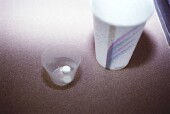
FRIDAY, May 30, 2014 (HealthDay News) — In the wake of concerns that calcium supplements increase the risk for heart attack or stroke, a large, new U.S. study offers women and their doctors some reassurance.
Researchers from Brigham and Women’s Hospital in Boston found, in a study of more than 74,000 women, that these supplements are safe in terms of heart health.
Millions of women take calcium supplements in an attempt to boost bone strength, especially after menopause when the risk of fractures increases. This is so even though experts generally recommend that calcium come from diet rather than supplements.
“One study found that more than 60 percent of women 60 and over were taking calcium supplements,” said lead researcher Dr. Julie Paik of the hospital’s Channing Division of Network Medicine.
Some recent research has linked calcium supplementation with heart disease. Such studies suggested the daily supplements may increase calcification of the arteries and veins, which could raise the risk of heart attack.
This new study found no raised risk of heart attack or stroke among women taking calcium supplements during 24 years of follow-up. Calcium supplementation was actually associated with lower risk of heart disease, the researchers said.
However, the medical community is still uncertain of the effects of calcium supplements in women, Paik added.
“Our study adds to the existing body of evidence supporting that calcium supplements do not increase the risk of heart attack or stroke in women,” she said.
Women in the study who took calcium supplements exercised more, smoked less and ate less trans fat than women who did not take supplements, the researchers noted.
Dr. Mary Ann McLaughlin, director of the cardiac health program at Mount Sinai Hospital in New York City, said the study doesn’t prove that supplements prevent heart attacks or stroke, because those other positive behaviors might have affected the women’s health.
What it does show is that in women who already engage in healthy behaviors, calcium supplements didn’t harm them, she said.
The report was published online in the May issue of Osteoporosis International.
Noting that all women are different, Paik said patients should talk with their doctor about whether taking calcium supplements is right for them.
Also, more studies are needed to further understand the effects of calcium supplements on the heart and arteries, she said.
McLaughlin believes in eating calcium-rich foods, such as milk, cheese, tofu, rice milk, salmon, sardines, broccoli, kale and almonds before relying on supplements.
For the study, Paik and colleagues collected data on 74,245 women who took part in the Nurses’ Health Study. Calcium supplement use was assessed every four years.
During 24 years of follow-up, there were 2,709 heart attacks and 1,856 strokes.
After adjusting for heart-risk factors such as age, body mass index and dietary calcium, there was no significant difference in the rate of heart attack or stroke between women who took more than 1,000 milligrams of calcium a day and those who took none. The results were similar when the researchers analyzed nonsmokers, women without high blood pressure and those who exercised regularly.
Dr. Nieca Goldberg, a clinical associate professor of medicine at NYU Langone Medical Center in New York City, said it’s important that women balance the calcium they get from their diet and supplements, she said. “Many women don’t get enough calcium in their diet,” she acknowledged.
Women need about 1,200 milligrams of calcium a day. She recommends that all or most of that calcium come from food intake. “I think it’s always better for us to get our nutrients from food, because that forces us to eat healthier,” she said.
Foods rich in calcium include dairy products such as milk, cheese and yogurt, green, leafy vegetables, sardines and salmon, and calcium-enriched foods such as cereals and fruit juices.
Whether calcium supplements do improve bone density of postmenopausal women isn’t agreed upon. Last year, the U.S. Preventive Services Task Force, an independent panel of experts, said not enough evidence exists for the task force to recommend that postmenopausal women take calcium supplements and vitamin D to prevent fractures.
More information
For more information on calcium supplements, visit the U.S. National Institutes of Health.
Copyright © 2026 HealthDay. All rights reserved.

